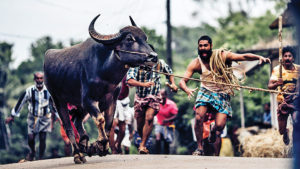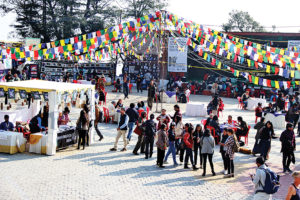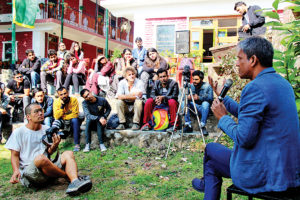Dharamshala International Film Festival (DIFF) directors Ritu and Tenzing talk about its journey, vision and challenges
The eighth edition of the Dharamshala International Film Festival (DIFF) is scheduled to take place from November 7 to 10, 2019 at the Tibetan Institute of Performing Arts (TIPA), McLeodganj, Dharamshala. DIFF is conceptualised by filmmakers Ritu Sarin and Tenzing Sonam, whose credits include films such as Dreaming Lhasa, The Sun Behind the Clouds and The Sweet Requiem.
The festival’s lineup for this year includes feature documentaries, narrative features, shorts as well as a special programme on children’s films curated by Children’s Media Specialist, Monica Wahi. The Indian films include Lijo Jose Pellissery’s Jallikattu, Archana Atul Phadke’s About Love, and Prateek Vats’ Eeb Allay Ooo — which also opens the festival. Gitanjali Rao’s feature animation Bombay Rose is the closing film of the festival. The international films include Cambodian filmmaker Kavich Neang’s Last Night I Saw You Smiling, legendary French filmmaker Agnès Varda’s Varda by Agnès, Palestinian filmmaker Bassam Jarbawi’s Mafak, and Portuguese filmmaker Pedro Costa’s Vitalina Varela.
In this interview, DIFF Festival directors Ritu and Tenzing talk about the vision behind the festival, the challenges of bringing independent cinema from all across the globe to a small hill-town in North India, and reflect upon the festival’s journey ever since its inception back in the year 2012.
Excerpts:
DIFF has kept itself away from any corporate control right from its inception back in 2012. What are the challenges of running a festival independently?
Ritu: Showcasing and championing independent cinema has always been the top priority for us, and we are keen on finding sponsors who share the same vision. But it’s not their topmost priority, and this has proven to be a challenge. We start out afresh looking for funding each year and this uncertainty puts a lot of strain on how we plan the festival, as it is so dependent on how much we can afford.

Is that why the festival has also kept a distance from mainstream cinema?
Tenzing: One of the main aims of DIFF is to showcase and promote independent cinema. We are really keen to provide a platform and a space for alternative films to be seen and discussed at the festival.
A lot of people who have visited DIFF frequently rate it amongst their top festival experiences. What were your influences and inspirations when you decided to set it up in the hills?
Ritu: Before we started DIFF, we had travelled to many international film festivals to screen our own films, and what we found was that some of the festivals we enjoyed the most were the ones that were a little off-beat and intimate, where the destination added another dimension to the event. We always knew that Dharamshala was an interesting location with its beautiful setting and its unusual mix of cultures, so even though there were no cinemas or a film culture in the area, we felt that it would be a good location for an independent film festival. And what we set out to create was an event that would prioritise the cinematic experience, where filmmakers and film lovers could congregate in an intimate setting, and perhaps that is why it has resonated with so many film lovers.
Dharamshala is the home to His Holiness the 14th Dalai Lama. Tell us about your association with His Holiness. Also, tell us about His Holiness’ involvement in DIFF.
Tenzing: On a personal note, we have made a number of films with His Holiness and have had the honour and privilege of filming him in many different places, including when he won the Nobel Prize in Oslo. His Holiness’ presence in Dharamshala is, of course, one of the key reasons of the town’s fame. However, His Holiness has no direct involvement in DIFF, but our invited filmmakers last year did have an opportunity to have a brief interaction with him.
What are the key attractions at the 2019 DIFF? Also, is there a specific theme this year?
Tenzing: As always, the films we show at DIFF cover a wide range of subjects and genres, and this year is no different. There is no specific theme other than that the films on offer are united by their strong personal and humanistic vision. Every film in the lineup has been carefully selected and we are very excited by the sheer diversity of their thematic concerns and creative risk-taking. Over the years, DIFF has also become a platform to showcase the best of new Indian cinema and this year too, we have a strong representation of Indian indie films from around the country. Besides the film selection, we are very excited to have acclaimed actor Adil Hussain come and give a masterclass on acting. Award-winning Japanese documentary filmmaker Kazuhiro Soda will also be on hand to talk about his very personal approach to observational documentary filmmaking.

How do you prepare for the festival every year? Tell us about the different processes involved and what it takes to keep it running. Does your close involvement in the festival affect your filmmaking endeavors?
Ritu: Each year, we have to start out first by looking for funds and then slowly putting the programme together. Our festival manager starts working about six months before the festival and our small team comes together about six weeks before it starts. Since we started DIFF, we have had less and less time to work on our projects. It is a constant struggle to find the balance between our filmmaking work and running DIFF, but hopefully, as the festival finds its own groove, we will be able to focus more on our personal work.
How has the festival grown over the years? How do you look back at this amazing journey?
Ritu: DIFF started out as a community event. We wanted to bring independent films to our hometown and expose local audiences to alternative cinema. But what we discovered is that DIFF filled a much-needed gap in the Indian film festival landscape. It was a truly independent festival, both in content and spirit, and that appealed to filmmakers and film lovers across the country. In the past eight years, DIFF has become a national event with the audience coming from every corner of India. This was something we never expected or even hoped for but it is truly gratifying.
What are your upcoming projects after DIFF?
Tenzing: We have a number of film projects that we are working on, including two feature film scripts and one documentary idea. Hopefully, one of these will soon see the light!





